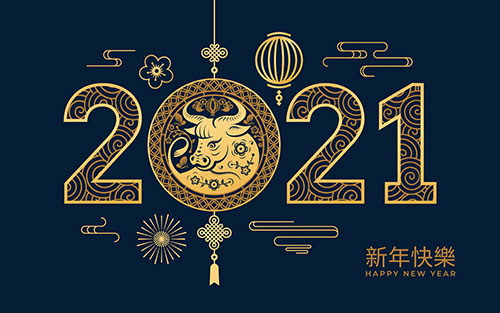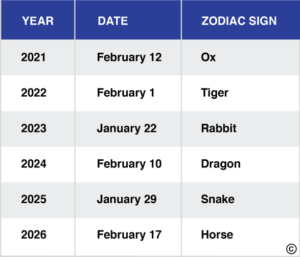
Image: stock.adobe.com By Sensvector
While most Western countries ring in New Year’s Day at midnight on January 1 following the solar calendar, many of our Asian neighbors celebrate New Year’s according to the lunar calendar, which in 2021 falls on February 12th, and is the Year of the Ox. Not just a single day festivity, the entire holiday lasts 15 days.
Brunei, China, Hong Kong, Indonesia, Macau, Malaysia, the Philippines, Singapore, South Korea, Taiwan, and Vietnam observe the Lunar New Year as a public holiday. Lunar New Year is also referred to as Spring Festival, or Chinese Chunjie, Korean Solnal, Tibetan Losar, Vietnamese Tet, and other holiday names throughout Asian nations.
Communities worldwide start the lunar calendar year with great anticipation and excitement. As a cross-cultural business consultant and author of the best-selling book Access to Asia, I’m going to explore cultural customs and traditions as well as explain how Chinese New Year varies from the Gregorian calendar New Year.
When exactly is Lunar New Year? How is it calculated? Is it the same day annually?
The 2021 Lunar New Year begins on Sunday, February 12, 2021, starting with the lunar calendar’s first new moon and ending on the following full moon, approximately 15 days later. The lunar calendar’s foundation is the moon’s cycles, so the 15 day holiday period varies slightly from year to year.
Since the celebration date is based upon the lunar calendar, and not the Western Gregorian calendar which follows the sun’s cycle, the holiday falls on a different day each year between January 21 and February 20. Like in the Western zodiac which maps the path of the sun across the sky and connects each zone to a sign like Capricorn or Cancer, the Chinese zodiac correlates each year with an animal sign. This year is the Year of the Ox, which is characterized by hard work and strength. The dates for the start of the next six Lunar New Years are included in the chart below.

Why is Lunar New Year traditionally celebrated?
Like many cultures, the new year in China and many other Asian countries signifies a fresh start. Traditionally families and friends gather together for joyous celebrations after a year of hard work; although this year, the Chinese central government is discouraging travel due to Covid-19. Historically, the new year marked a new farming season, and families wished for a plentiful harvest. In today’s society, this tradition commemorates a new business year with hopes for prosperity and success.
How will the Celebration be Different this Year due to Covid-19?
Many Chinese may defer travel plans this year in compliance with the Central Chinese Government. In addition to imposing Covid-19 testing and arrival isolation requirements, local municipalities are supporting the central government by offering incentives and subsidies for those staying home and refraining from travel.
How do Asian communities celebrate this holiday?
Although celebrations vary between regions and countries, a cleansing process typically occurs. About 10 days before the holiday starts, in a custom called “sweeping of the grounds,” homes are thoroughly cleaned to dispel any bad luck that may remain. Traditionally, New Year’s Eve and New Year’s Day are reserved for family celebrations, including religious ceremonies honoring ancestors.
One of the main traditions includes an intergenerational feast with family, firecrackers, and red clothing symbolizing luck and prosperity. These feasts may be smaller this year. Chinese cities, like Beijing, may postpone their popular festivals with dragon dances and fireworks due to social distancing. Rural areas may continue to observe traditional activities such as ancestor worship, with safety protocols in place. However, this year’s new year festivities and travel are expected to be more subdued.
What gifts can I give my friends or coworkers celebrating this holiday?
The Chinese New Year’s traditional gift is a red money envelope or packet containing an even number of bills. Gifts of peach blossoms symbolize lasting relationships, pineapple or bamboo represents prosperity, and bottle gourds signify longevity and wealth.
Research the lucky numbers of each country. For example, in China, consider giving items in even numbers, except for four. Eight is the luckiest number in Chinese culture, so a set of eight items would be greatly appreciated by the recipients.
What is the Lantern Festival?
The final event during the New Year festivities falls on the 15th day of the new year, the Lantern Festival. People hang glowing lanterns or carry these beautiful lights during an evening parade. In China, the dragon is a good fortune symbol so a dragon dance highlights many area festivities. I was fortunate enough to be in Hong Kong during Chinese New Year in 2016, and participated in a short, colorful dragon procession. I enjoyed the cultural experience, but will defer to the professional dancers!
Sharon Schweitzer, J.D., is a cross-cultural trainer, diversity and inclusion coach and the founder of Access to Culture. In addition to her accreditation in intercultural management with the HOFSTEDE center, she serves as a Chinese Ceremonial and Banquet Dining Etiquette Specialist in the documentary series Confucius was a Foodie, on Nat Geo People. Her Amazon #1 best-selling book Access to Asia now in its second printing, was named to Kirkus Reviews’ Best Books. Sharon is the winner of the British Airways International Trade, Investment & Expansion Award at the Greater Austin Business Awards.
#Sharonschweitzer #accesstoculture #LunarNewYear #LunarNewYear2021 #ChineseNewYear #Brunei #China #Hong Kong #Indonesia #Macau #Malaysia #Philippines #Singapore #Korea #Taiwan #Vietnam #cultureexpert

Leave A Comment